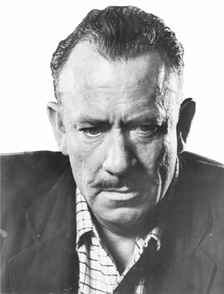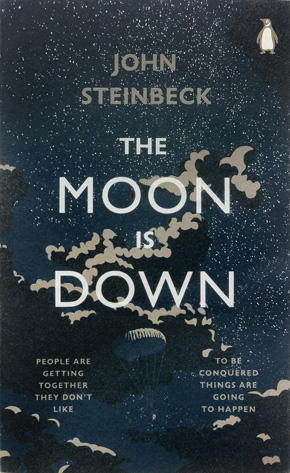Conquered
by John SteinbeckThe days and the weeks dragged on, and the months dragged on. The snow fell and melted and fell and melted and finally fell and stuck. The dark buildings of the little town wore bells and hats and eyebrows of white and there were trenches through the snow to the doorways. In the harbor the coal barges came empty and went away loaded, but the coal did not come out of the ground easily. The good miners made mistakes. They were clumsy and slow. Machinery broke and took a long time to fix. The people of the conquered country settled in a slow, silent, waiting revenge. The men who had been traitors, who had helped the invaders – and many of them believed it was for a better state and an ideal way of life – found that the control they took was insecure, that the people they had known looked at them coldly and never spoke.
And there was death in the air, hovering and waiting. Accidents happened on the railroad, which clung to the mountains and connected the little town with the rest of the nation. Avalanches poured down on the tracks and rails were spread. No train could move unless the tracks were first inspected. People were shot in reprisal and it made no difference. Now and then a group of young men escaped and went to England. And the English bombed the coal mine and did some damage and killed some of both their friends and their enemies. And it did no good. The cold hatred grew with the winter, the silent, sullen hatred, the waiting hatred. The food supply was controlled – issued to the obedient and withheld from the disobedient – so that the whole population turned coldly obedient. There was a point where food could not be withheld, for a starving man cannot mine coal, cannot lift and carry. And the hatred was deep in the eyes of the people, beneath the surface.
Now it was that the conqueror was surrounded, the men of the battalion alone among silent enemies, and no man might relax his guard for even a moment. If he did, he disappeared, and some snowdrift received his body. If he went alone to a woman, he disappeared and some snowdrift received his body. If he drank, he disappeared. The men of the battalion could sing only together, could dance only together, and dancing gradually stopped and the singing expressed a longing for home. Their talk was of friends and relatives who loved them and their longings were for warmth and love, because a man can be a soldier for only so many hours a day and for only so many months in a year, and then he wants to be a man again, wants girls and drinks and music and laughter and ease, and when these are cut off, they become irresistibly desirable.
Gradually a little fear began to grow in the conquerors, a fear that one day they would crack and be hunted through the mountains like rabbits, for the conquered never relaxed their hatred.”
And the men thought always of home. The men of the battalion came to detest the place they had conquered, and they were curt with the people and the people were curt with them, and gradually a little fear began to grow in the conquerors, a fear that it would never be over, that they could never relax or go home, a fear that one day they would crack and be hunted through the mountains like rabbits, for the conquered never relaxed their hatred. The patrols, seeing lights, hearing laughter, would be drawn as to a fire, and when they came near, the laughter stopped, the warmth went out, and the people were cold and obedient. And the soldiers smelling warm food from the little restaurants, went in and ordered the warm food and found that it was oversalted and overpeppered.
Then the soldiers read the news from home and from the other conquered countries, and the news was always good, and for a little while they believed it, and then after a while they did not believe it any more. And every man carried in his heart the terror. “If home crumbled, they would not tell us, and then it would be too late. These people will not spare us. They will kill us all.” They remembered stories of their men retreating through Belgium and retreating out of Russia. And the more literate remembered the frantic, tragic retreat from Moscow, when every peasant’s pitchfork tasted blood and the snow was rotten with bodies.
And they knew when they cracked, or relaxed, or slept too long, it would be the same here, and their sleep was restless and their days were nervous. They asked questions their officers could not answer because they did not know. They were not told, either. They did not believe the reports from home, either.
Thus it came about that the conquerors grew afraid of the conquered and their nerves wore thin and they shot at shadows in the night. The cold, sullen silence was with them always. Then three soldiers went insane in a week and cried all night and all day until they were sent away home. And others might have gone insane if they had not heard that mercy deaths awaited the insane at home, and a mercy death is a terrible thing to think of. Fear crept in on the men in their billets and it made them sad, and it crept into the patrols and it made them cruel.
The year turned and the nights grew long. It was dark at three o’clock in the afternoon and not light again until nine in the morning. The jolly lights did not shine out on the snow, for by law every window must be black against the bombers. And yet when the English bombers came over, some light always appeared near the coal mine. Sometimes the sentries shot a man with a lantern and once a girl with a flashlight. And it did no good. Nothing was cured by the shooting.
And the officers were a reflection of their men, more restrained because their training was more complete, more resourceful because they had more responsibility, but the same fears were a little deeper buried in them, the same longings were more tightly locked in their hearts. And they were under a double strain, for the conquered people watched them for mistakes and their own men watched them for weakness, so that their spirits were taut to the breaking-point. The conquerors were under a terrible spiritual siege and everyone knew, conquered and conquerors, what would happen when the first crack appeared.
From The Moon Is Down, reissued by Penguin Modern Classics.
 John Steinbeck (1902–1968) was one of the great American writers of the twentieth century. During the 1930s, his works included The Red Pony, Pastures of Heaven, Tortilla Flat, In Dubious Battle and Of Mice and Men. The Grapes of Wrath, published in 1939, earned him a Pulitzer Prize, and in 1962 he was awarded the Nobel Prize for Literature.
John Steinbeck (1902–1968) was one of the great American writers of the twentieth century. During the 1930s, his works included The Red Pony, Pastures of Heaven, Tortilla Flat, In Dubious Battle and Of Mice and Men. The Grapes of Wrath, published in 1939, earned him a Pulitzer Prize, and in 1962 he was awarded the Nobel Prize for Literature.
Originally published at the height of Nazi German power in 1942, Steinbeck’s short novel The Moon Is Down explores the effects of invasion on both the conquered and the conquerors in an unnamed, peaceable town in northern Europe. As he delves into the motivations and mental state of ‘the enemy’ from either side, Steinbeck foregrounds profound and unsettling truths about war and human nature. The Moon Is Down is one of five Steinbeck titles reissued by Penguin Modern Classics with striking new cover art.
Read more.


